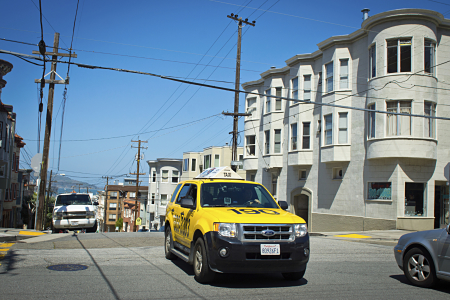The California Legislature is again wrestling with the on-demand economy, perhaps best exemplified by ride-hail giants Uber and Lyft, which have gutted the taxi cab industry.
 The California Senate’s Transportation and Housing Committee and the Senate Committee on Energy, Utilities and Communications are grappling with how to create a “level playing field” in the transportation-for-hire market.
The California Senate’s Transportation and Housing Committee and the Senate Committee on Energy, Utilities and Communications are grappling with how to create a “level playing field” in the transportation-for-hire market.
Hearings have been tense with representatives from Uber and Lyft mixing it up with taxi and livery drivers. The taxi industry is crying foul, saying that the newcomers are cutting into their business without having to meet the same insurance, medallion fees and background checks they are subject to.
While legislators are mulling the issue, the California Public Utilities Commission is weighing in as well, now considering requiring drivers for all ride services, including Uber and Lyft, to undergo fingerprint background checks, just as Uber is facing more scrutiny over its screening process.
In January, commissioner Liane Randolph declined to recommend more rigorous screenings for ride-service drivers. But in proposing a new set of rules for transportation network companies, Randolph wrote that the CPUC would issue a ruling “posing questions about background checks and establishing the identity of drivers through methods such as fingerprinting.”
Randolph did propose fingerprint checks in the revised rules for services like Shuddle, which transport unaccompanied minors. The full CPUC is scheduled to consider the proposals in mid-March in what’s called “Phase II” of the regulatory process for transportation network companies.
The largest ride-service company, Uber, came under more criticism over its background checks following a recent mass shooting in Michigan. The attack was allegedly committed by an Uber driver, who is charged with killing six people and wounding two others.
“No background process would have made a difference in this case because the person had no criminal history,” said Uber’s Joe Sullivan, chief security officer.
Uber uses Checkr, which looks at a person’s criminal history for the past seven years. The ride-service company has maintained that all background checks available today contain flaws, even though fingerprint checks are considered by many law enforcement, transportation and taxicab industry officials to be the “gold standard.”
The kind of background checks Uber uses are the same kind of screenings any company might do on a prospective employee, but not for someone being placed in a position of trust, said Dave Sutton, the spokesman for Who’s Driving You, a public safety campaign of the Taxicab, Limousine and Paratransit Association.
“Not all background checks are alike,” said Sutton. “What we’re really talking about are fingerprint-based background checks conducted by government.”
Sutton said the vast majority of large U.S. cities require fingerprint checks for taxi drivers, who have been arguing that ride services should face the same kind of background checks and training that they do.
Uber contends that fingerprint background checks are not 100 percent accurate, and can include people not actually convicted of the crimes they were accused of.
“Our problem with fingerprinting is, we think it’s discriminatory, meaning there’s a lot of people who might have been arrested who were not convicted that will be denied this opportunity,” said Uber senior adviser David Plouffe.
Uber recently announced that it would give people convicted of nonviolent felonies whose crimes were reduced to misdemeanors under California’s Proposition 47, an opportunity to drive.
‘It’s one thing to sign up online in a couple of days. It’s quite another to be fingerprinted and go down to the police station.’
Sutton believes the reason Uber is opposed to fingerprint checks is that half of Uber’s 400,000 drivers in the U.S. are part-timers, driving less than 10 hours a week, and many would rather not go through the process of getting fingerprinted.
Current California regulations require ride services to conduct criminal background checks that go back seven years, but not fingerprint checks. Sutton believes regulators have been slow to require a stricter screening process because of Uber’s political power and success in beating back tougher regulations.
Sutton said ride-service companies may likely change their policies on background checks when enough customers demand it.
“Essentially, what’s happening is exactly what happened in the taxi industry,” Sutton said. “Enough bad things happened that enough people become aware that this is absolutely a must-do, and so the political will was established.”
